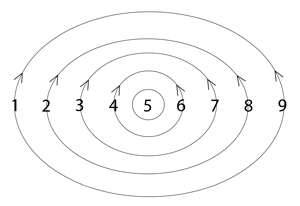past
1-1-2
Conventional Understanding
We usually think of the past as events that already happened and are now behind us. We talk about “moving on” from the past or being “stuck in the past,” seeing it as separate from our present experience. This view creates a linear timeline where we’re constantly moving away from what happened before.
Resonant Understanding
Word Cosmology shows “past” carries the same pattern as “see” (1-1-2). In the creative sequence, “past” represents our ability to perceive ideas that have already taken form. Rather than events we’ve left behind, “past” is the natural perceptual stage that follows after ideas first emerge. This changes our understanding from seeing the past as “gone time” to recognizing it as an active part of how we perceive what has already formed.
Expressions Spectrum
In balanced expression, this pattern appears as “being the cause,” “information knowing,” and “see” – showing clear perception of what has formed.
When over-modulated, it becomes “stored energy,” “clever,” and “mental reality” – where perception becomes fixed or overly conceptualized. When under-modulated (too loose), it appears as “being my reflection,” “disharmony with life,” and “unaware” – where perception lacks coherence.
The uncategorized expressions like “cube wave fields,” “thought wave universe,” and “still point of the one light” show universal patterns that become perceivable at this stage.
Russell’s Connection
Walter Russell’s work describes a creative process where ideas first take form and then become perceivable – aligning with “past” as the perceptual stage following embodiment. Russell emphasizes that reality unfolds through simultaneous two-way motion rather than linear progression, connecting to expressions like “the action occurs simultaneously” in the past table.
Practical Implications
This understanding changes how we relate to the past. Instead of trying to escape or overcome past events, we can recognize them as part of our natural perception of what has already formed. When we struggle with past events, we’re either conceptualizing them too rigidly or failing to perceive them clearly.
By understanding “past” as the perceptual stage in the creative process, we can engage with time more naturally – seeing it as functional rather than linear. This helps us approach memory, learning, and personal growth not as moving away from the past, but as clearly perceiving what has already taken form as part of our ongoing creative experience.


